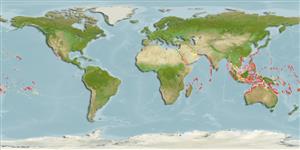Common names from other countries
Environment: milieu / climate zone / depth range / distribution range
Ecologia
marinhas associadas(os) a recifes; intervalo de profundidade 6 - 30 m (Ref. 86942). Tropical; 30°N - 24°S
Indo-Pacific: Red Sea and East Africa to Fiji (Ref. 10708) and Tonga (Ref. 53797), north to the Yaeyama Islands, south to the Great Barrier Reef. Ulithi in Micronesia.
Tamanho / Peso / Idade
Maturity: Lm ? range ? - ? cm
Max length : 1.8 cm SL macho/indeterminado; (Ref. 89154)
Espinhos dorsais (total): 7 - 8; Raios dorsais moles (total): 7-8; Espinhos anais 1; Raios anais moles: 8. Dorsal-fin rays VI + I,8 (rarely I,7); anal-fin rays I,8; pectoral-fin rays usually 13 or 14; body naked anterior to rear base of first dorsal fin, the longitudinal scale count 31–37 (mean scale count 33); body depth at origin of anal fin 13.3–17.5% SL; body progressively compressed posteriorly; head width greater than head depth and broader ventrally; snout length shorter than orbit diameter; gill opening extending forward to or anterior to posterior margin of preopercle; no canine tooth at side of lower jaw; caudal fin truncate to slightly rounded; pelvic fins short, round, and cup-like, the pelvic spines short; body translucent greenish yellow, the skeletal features of body visible; head and abdomen yellowish green with numerous black dots; a yellowish green band with black dots from eye to eye across front of snout and enclosing nostrils; red of gill filaments visible through operculum; fins translucent; iris dusky yellowish green with a broad inner white circle. A small species, the largest specimen 17.8 mm SL (Ref. 89154).
Inhabits lagoon and seaward reefs and found on large Porites knoll and branching Millepora.
Life cycle and mating behavior
Maturidade | Reprodução | Desova | Ovos | Fecundidade | Larvas
Myers, R.F., 1991. Micronesian reef fishes. Second Ed. Coral Graphics, Barrigada, Guam. 298 p. (Ref. 1602)
Categoria na Lista Vermelha da IUCN (Ref. 130435)
CITES (Ref. 128078)
Not Evaluated
Ameaça para o homem
Harmless
Utilização humana
Mais informação
Nomes comunsSinónimosMetabolismoPredadoresEcotoxicologiaReproduçãoMaturidadeDesovaFecundidadeOvosDesenvolvimento dos ovos
ReferênciasAquaculturaPerfil para aquaculturaEstirpesGenéticaElectrophoresesHereditariedadeDoençasProcessamentoMass conversion
Ferramentas
Relatórios especiais
Descarregue XML
Fontes da internet
Estimates based on models
Preferred temperature (Ref.
115969): 25.2 - 29.3, mean 28.2 (based on 2327 cells).
Phylogenetic diversity index (Ref.
82804): PD
50 = 0.5000 [Uniqueness, from 0.5 = low to 2.0 = high].
Bayesian length-weight: a=0.01023 (0.00477 - 0.02194), b=3.02 (2.84 - 3.20), in cm Total Length, based on LWR estimates for this (Sub)family-body shape (Ref.
93245).
Nível Trófico (Ref.
69278): 3.0 ±0.3 se; based on size and trophs of closest relatives
Resiliência (Ref.
120179): Elevada, tempo mínimo de duplicação da população menor que 15 meses (Preliminary K or Fecundity.).
Fishing Vulnerability (Ref.
59153): Low vulnerability (10 of 100).
